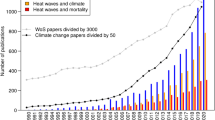Abstract
Studies have indicated that many people misunderstand climate change. Equipped with a limited mental model they inappropriately use a pattern matching heuristics to analyze climate change and mistakenly believe that we can stabilize atmospheric CO2 by keeping anthropogenic emissions at current rates. Drawing on the findings from cognitive and developmental psychology, I argue that the widespread misunderstanding of climate change may arise from an error in people’s ontological assumptions. The pattern matching heuristics highlights correlations in shape and associates with a static mental model, both of which are effective for understanding objects. When people adopt the pattern matching heuristics, they may have implicitly treated climate change as an object. However, climate change belongs to a different kind of ontological existence. It is a dynamic process with temporal totality and inertia, two unique features essential to understanding climate change. Due to the sequence of cognitive development, we have developed an object bias – a tendency to treat processes as objects. This object bias can become a mental block, preventing us from adopting appropriate mental models to analyze climate change. To understand climate change, we need a fundamental transformation from an object-only ontology to a new one that properly treats objects and processes as distinct kinds. Finally, I briefly discuss strategies to foster the new ontological perspective in the discussion of climate change.
Similar content being viewed by others
References
Baillargeon R, Spelke E, Wasserman S (1985) Object permanence in 5-month-old infants. Cognition 20:191–208
Barsalou L (1991) Deriving categories to achieve goals. In: Bower G (ed) The psychology of learning and motivation, vol 27. Academic, New York, pp 1–64
Barsalou L, Sewell D (1985) Constrasting the representation of scripts and categories. J Mem Lang 24:646–665
Carey S, Spelke E (1994) Domain-specific knowledge and conceptual change. In: Hirschfeld L, Gelman S (eds) Mapping the mind: domain specificity in cognition and culture. Cambridge University Press, Cambridge, pp 169–200
Carey S, Spelke E (1996) Science and core knowledge. Philos Sci 63:515–533
Chen X (2007) The object bias and the study of scientific revolutions: lessons from developmental psychology. Philos Psychol 20:479–503
Chi M (1992) Conceptual change within and across ontological categories: examples from learning and discovery in science. In: Giere R (ed) Cognitive models of science. University of Minnesota Press, Minneapolis, pp 129–186
Cronin M, Gonzalez C (2007) Understanding the building blocks of dynamic systems. Syst Dyn Rev 23:1–17
Cronin M, Gonzalez C, Sterman J (2008) Why don’t well-educated people understand accumulation? A challenge to researchers, educators, and citizens. Org Behav Human Decis Process 108:116–130. doi:10.1016/j.obhdp.2008.03.003
Hacker P (1982) Events and objects in space and time. Mind 91:1–19
Hirsch E (1982) The concept of identity. Oxford University Press, New York
IPCC (2001) Climate change 2001: The scientific basis. Technical summary. A report of working group 1 of the intergovernmental panel on climate change. IPCC Third Assessment Report
Joyce T (2006) Observations on global warming. Presentation to the Aspen Institute, Washington, DC, June 17, 2006
Keil F (1979) Semantic and conceptual development: an ontological perspective. Harvard University Press, Cambridge
Landau B, Stecker D (1990) Objects and places: geometric and syntactic representations in early lexical learning. Cogn Dev 5:287–312
Landau R, Smith L, Jones S (1988) The importance of shape in early lexical learning. Cogn Dev 3:299–321
Pala Ö, Vennix J (2005) Effect of system dynamics education on system thinking inventory task performance. Syst Dyn Rev 21:147–172
Proffitt D, Gilden D (1989) Understanding natural dynamics. J Exp Psychol Hum Percept Perform 15:384–393
Reiner M, Slotta D, Chi M, Resnick L (2000) Naive physics reasoning: a commitment to substance-based conceptions. Cogn Instr 18:1–34
Rosch E, Mervis C, Gray W, Johnson D, Boyes-Braem P (1976) Basic objects in natural categories. Cogn Psychol 8:382–439
Schmitt R (2000) The ocean’s role in climate. Testimony to the Senate Committee on Commerce, Science, and Transportation. July 18, 2000
Slotta J, Chi M (2006) Helping students understand challenging topics in science through ontological training. Cogn Instr 24:261–289
Slotta J, Chi M, Joram E (1995) Assessing students’ misclassifications of physics concepts: an ontological basis for conceptual change. Cogn Instr 13:373–400
Spelke E (1991) Physical knowledge in infancy: reflections on piaget’s theory. In: Carey S, Gelman R (eds) The epigenesis of mind: essays in biology and cognition. Lawrence Erlbaum, Hillsdale, NJ, pp 133–169
Sterman J (2008) Risk communication on climate: mental models and mass balance. Science 322:532–533
Sterman J, Booth Sweeney L (2002) Cloudy skies: assessing public understanding of global warming. Syst Dyn Rev 18:207–240
Sterman J, Booth Sweeney L (2007) Understanding public complacency about climate change: adults’ mental models of climate change violate conservation of matter. Clim Change 80:213–238
Trabasso T, Riley C (1975) On the construction and use of representation involving linear order. In: Solso R (ed) Information processing and cognition: the loyola symposium. Erlbaum, Hillsdale, pp 381–410
Author information
Authors and Affiliations
Corresponding author
Rights and permissions
About this article
Cite this article
Chen, X. Why do people misunderstand climate change? Heuristics, mental models and ontological assumptions. Climatic Change 108, 31–46 (2011). https://doi.org/10.1007/s10584-010-0013-5
Received:
Accepted:
Published:
Issue Date:
DOI: https://doi.org/10.1007/s10584-010-0013-5



